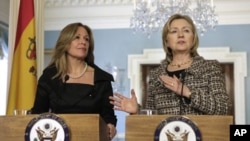Secretary of State Hillary Clinton says the emergence of a Hezbollah-controlled Lebanese government would clearly have an impact on U.S.-Lebanese relations. She also said the United States believes Egypt is stable, despite Tunisia-style protests there.
Clinton says it is too early to judge the emerging government in Lebanon, but she is making clear U.S. apprehension about the prospect of a Beirut government dominated by Hezbollah and subject to Iranian influence.
The Lebanon situation, and political unrest in North Africa that spread to Egypt this week, dominated a meeting between Clinton and Foreign Minister Trinidad Jiminez of Spain, which has close relations with North Africa and leads the U.N. peacekeeping force in south Lebanon, UNIFIL.
Clinton said she and her Spanish counterpart share deep concerns about the influence in Lebanon of outside forces, an apparent reference to Iran and Syria, which have backed Hezbollah.
She said while the process of government formation is just beginning, the prospect of a leading role for the Shiite militia and political movement is troubling.
"A Hezbollah-controlled government would clearly have an impact on our bilateral relationship with Lebanon," she said. "Our bottom lines remain as they always have been. First, we believe that justice must be pursued and impunity for murder ended. We believe in Lebanon’s sovereignty and an end to outside interference. So as we see what this new government does, we will judge it accordingly."
Hezbollah has pushed for an end to support by the Lebanese government for the U.N.-backed tribunal on the 2005 assassination of former Lebanese Prime Minister Rafik Hariri.
Lebanon’s government crisis was spurred in part by secret indictments from the tribunal that are widely expected to implicate Hezbollah in the car-bomb killing.
The United States lists Hezbollah as a terrorist organization, and officials in Washington say its apparent rise to power will impact U.S. economic and military aid to Lebanon of nearly $250 million a year.
View Margaret Besheer's audio slideshow of the protest in Lebanon
On the Egyptian political unrest, Clinton said the United States is monitoring the situation closely, but does not think the turmoil affects the stability of the Cairo government, a key U.S. ally.
"We support the fundamental right of expression and assembly for all people," said the secretary of state. "And we urge that all parties exercise restraint and refrain from violence. But our assessment is that the Egyptian government is stable and is looking for ways to respond to the legitimate needs and interests of the Egyptian people."
Clinton said she and Foreign Minister Jiminez discussed how the United States and European Union can help Tunisia in its transition from authoritarian rule to democracy.
She said while the country has a "long way to go," she is encouraged, after contacts with leaders of the interim government in Tunis, about their commitment to inclusive elections to be held as soon as practicable.




